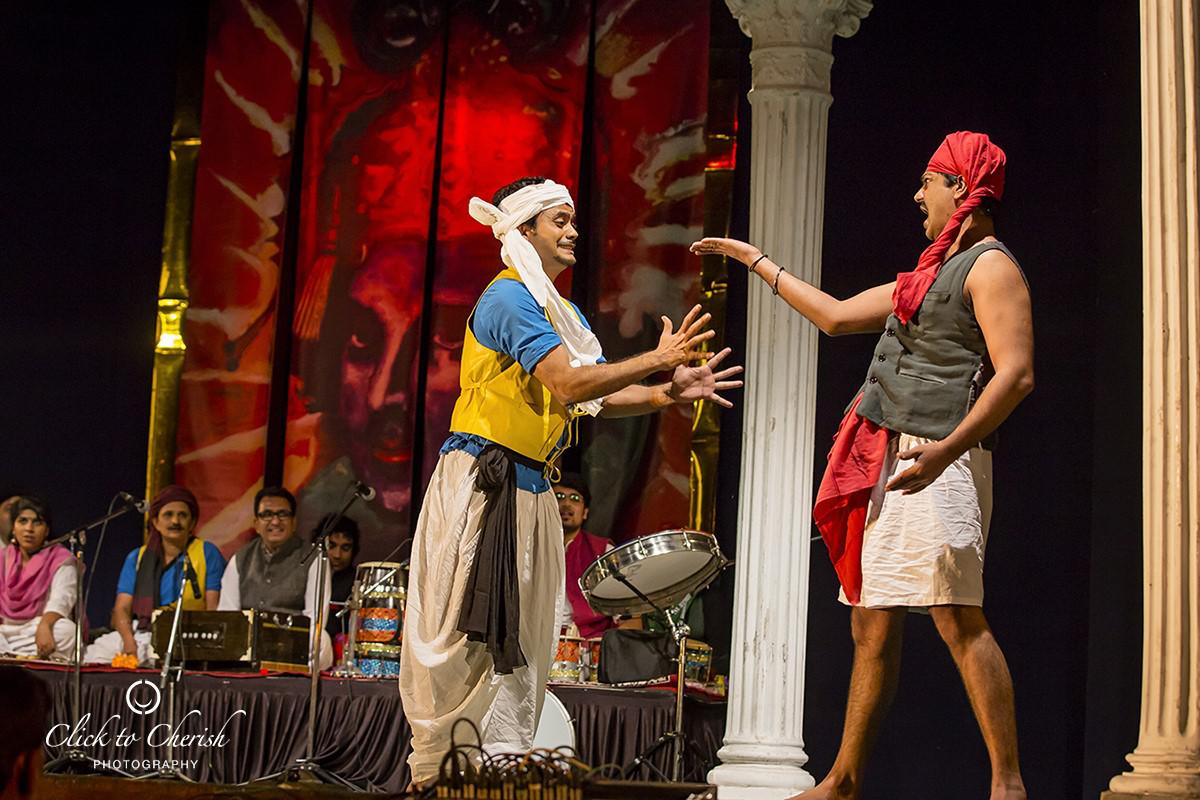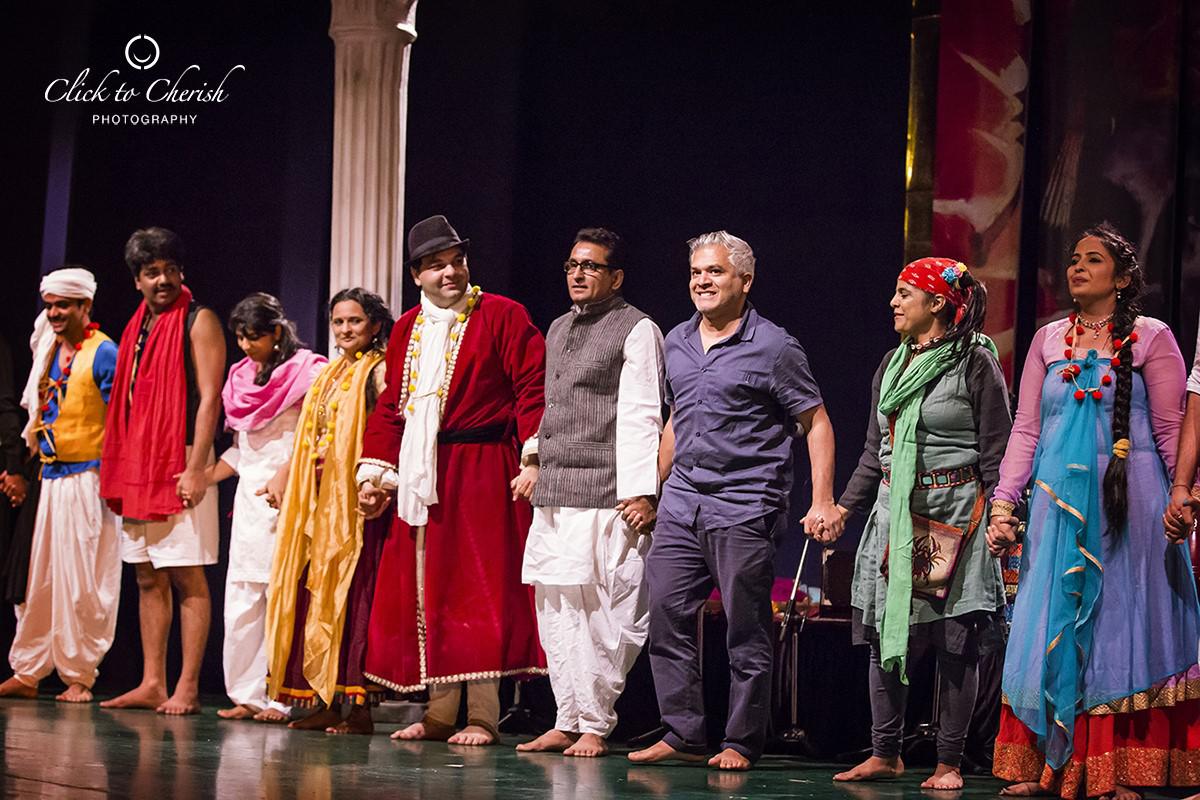
Piya Behrupiya had its final tour in India recently
| Photo Credit: Courtesy: The Company Theatre
There were about two weeks before the play premiered at Globe Theatre in London. Atul Kumar, founder of The Company Theatre, had assigned his childhood friend and theatre colleague Rajat Kapoor the task of translating Shakespeare’s Twelfth Night into Hindi. The translation was done up to the third Act. Rehearsals were in full swing. Nothing was missing. Until Amitosh Nagpal wrote a whacky song that the director of the play, Atul, instantly loved. Atul regretted, however, that the song did not fit into the play’s form at that point. “Why not change the form of the play?” asked Amitosh, the lyricist in the team then. The rest is Piya Behrupiya — a play that has travelled over the world in 11 years, completed close to 300 shows, and has now exited the stage forever.
Making of the play
Atul recalls that making the call to Rajat was one of the challenging moments in the play’s creation. “He took it really well though I felt awful. The adaptation that Amitosh wrote worked so well — the humour, songs, dialogues!”
Amitosh remembers working day and night for the next few days, adapting Twelfth Night into an uproariously hilarious Nautanki play. “I had always wanted to translate a classical text into colloquial Hindi. And when you love what you are doing, it is not challenging,” he says.

Shakespeare’s play gets a nautanki flavour
| Photo Credit:
Courtesy: The Company Theatre
This is what sets Piya Behrupiya apart: it’s difficult to decide who is having more fun — the play-makers or the audience. Before watching Piya Behrupiya for the nth (and last) time recently in Bengaluru, I spoke to many people in the auditorium who had also followed the play across venues and time. Some said it was for the live folk music, and some for seamlessly bringing together Kabir and Shakespeare, and Nautanki and Elizabethan drama.
A fine balance
As the play unfolded under Shakespeare’s amused expression (captured in a larger-than-life backdrop), you could almost see the lines criss-crossing — between the notes of the harmonium and the actors’ bodies, between the plot points of Twelfth Night and a loyal adaptation sprinkled with hyper-local references (like “Malleswaram Saraswathi”), between love stories jumbled up in unexpected ways (he loves her and sends messages galore but she falls in love with his messenger who is actually ‘her’ not ‘him’ and so on).

Team Piya Behrupiya with director Atul Kumar
| Photo Credit:
Courtesy: The Company Theatre
For Atul, love is the greatest take-away from the play. “Every time we put up this play, we experience so much love,” he says. Amitosh, who famously says “pyaar se better feeling, koi nahi hai yaar” in his inimitable onstage persona, agrees. “As writers and creative people, we intellectualise things.” This play was an opportunity to spotlight the “mazaa” and madness of love, he adds. Piya Behrupiya’s success is, of course, inextricably linked with the commitment of the cast and musicians to the playfulness and yearning at its core. They sing and dance their way into the audience’s hearts from the word go. Despite growing professionally in parallel performance arenas like cinema and television, most of the original cast stayed with the production.
Geetanjali Kulkarni’s portrayal of Cesario/Viola, Mansi Multani’s song notes and expressions as Olivia, Saurabh Nayyar’s crazy antics as Malvolio, Gagan Riar’s drunken Toby, Neha Saraf’s sprightly Geste, Trupti Khamkar’s mischievous Maria, Sagar Deshmukh’s surefooted Orsino, Amitosh Nagpal’s sparkling Sebastian and Mantra Mugdha’s Bangla Babu Andrew — are not about to be forgotten by fans any time soon.
The music rendered by Amod Bhatt on the harmonium, Rahul Sharma on the dholak and Jhanavi Marathe on percussion accompaniment was crucial to the play. It would not be an exaggeration to state that the Malwi Kabir songs popularised by renowned folk musicians like Prahlad Singh Tipaniya that have been used liberally in the play, accentuated its flavour, making it more remarkable.
Tracing the journey of the play, Atul says that the version staged at Globe Theatre was wordier and rather different. “After 50 shows, the actors got really comfortable and started improvising. I always gave them full liberty because they know the framework of the play really well.”
Over the years, the whole team worked together to apply “a more conscious lens” with respect to gender, sexuality and class, among other things. Maybe in a few years the play would have delved into gender fluidity, cross-dressing and more, feels Atul. But now, the play is closing because the actors have gotten busy and have different creative preoccupations. “Maybe there will be another version with a new cast but now it is time to move on,” says Atul, not without sadness. After touring couple of Indian cities with the purpose of saying goodbye, the last and final show of Piya Behrupiya was staged on July 30 in Ahmedabad.
Stay connected with us on social media platform for instant update click here to join our Twitter, & Facebook
We are now on Telegram. Click here to join our channel (@TechiUpdate) and stay updated with the latest Technology headlines.
For all the latest Entertainment News Click Here
For the latest news and updates, follow us on Google News.
